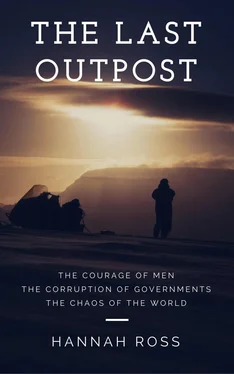It was a bright, snowless day, but they were met by a brisk, freezing, dry wind, and Scott instinctively lowered his face. He noticed that Lindholm was leading the way down a narrow trail and, his curiosity peaking, he followed. “Is it a far walk?” he asked.
“Nothing you might have to apprehend. I was a fair hiker in my day but, I assure you, in my eightieth year I am no match for you, my friend.”
As they were walking, Scott noticed Lindholm take out a little thermal flask and briefly apply it to his lips. He didn’t ask, but he suspected it didn’t contain water.
The trail descended into the valley. It was mostly sheltered and snow-free, but the slippery icy boulders made walking a challenge. Scott wasn’t sure how safe it actually was, just the two of them heading down alone. Granted, he had the portable radio and could call out to the pilot for help at any moment, but still. Anders Lindholm, however, appeared unconcerned, and kept choosing the best places to step on with the agility of an old, experienced mountain goat.
After about half an hour, they both simultaneously stopped, being out of breath. “Does it just seem to me,” Scott ventured, “or is the air here… warmer and, I don’t know, less dry?”
A small smile flitted at the corners of Lindholm’s mouth. “Only a little farther,” he said.
They kept going down. The descent was steeper now, and Scott knew that he was not mistaken — it was definitely getting warmer and more humid. He would have been tempted to throw back the hood of his parka, if it didn’t go so strictly against all the safety regulations the instructor had hammered into his head that very morning. He did, however, take off his sunglasses — there was hardly any snow around, and the rays of the sun that filtered down were relatively gentle and soft.
Finally, the valley was in front of them, and Scott stopped, gasping for breath. This surpassed anything he had dreamed of.
It was as if a mere few steps separated the realm of winter, on the edge of which he now stood, and a completely different land. It was as warm as he could have expected it to be at the southern parts of New Zealand, and the land was covered with color he hadn’t seen for a long time — green, all shades of green. There were mosses and lichens and lush grasses, some of them flowering. There were even woody plants that looked like a cross between shrubs and trees — short and twisted, but still, it was wood growing in the middle of Antarctica, a thing Scott would have deemed by any account impossible. He heard the noises of life, a small animal darting somewhere through the grass, the twitter of a hidden bird. And there was something like steam or vapor raising from cracks in the rocky walls of the valley.
“Geysers,” Lindholm explained, enjoying his evident astonishment. “Antarctica has a very active volcanic profile, as you know. This valley has a unique microclimate, with a flora and fauna that aren’t found anywhere else in the world. The biological balance is very delicate — I am always afraid to venture within, out of concern that some foreign bacteria might penetrate this tiny domain. I do have this antiseptic spray here, however, for us to mist ourselves with.”
They walked a little way within and, as their feet stepped on soft moss, Lindholm unzipped his parka. Scott did the same. They were standing right by a crack that emitted vapor, pleasantly warm but giving off the sulphuric odor of rotten eggs. “It’s warm enough here for much taller trees to grow,” Lindholm kept talking, “but the problem is the light. Every year, the region is plunged into a night that lasts six months, so plants are entirely cut off from sunlight, and all that can survive are annual grasses and mosses, and these little trees that fall into deep slumber for half the year. They are a unique species — related to some arborescent shrubs found in the south of New Zealand, but it appears this particular tree has evolved right here in the valley.”
Scott squinted ahead. “Are those rock cairns I see in the distance?” he asked. “I understand that there has been some research going on—”
But then he noticed that the rock structures seemed like more than cairns. These were actual buildings, rounded, with neatly done stonework and what looked like doors and windows. The roofs were covered with some material Scott couldn’t recognize at a distance. They were conical, and a plume of smoke rose from one of them. And it was then that it hit him with a full impact — there were people, actual people living in this valley, and he was about to see them.
Transfixed, he couldn’t tear his eyes off the nearest building. Soon, there was some stirring within, and a man and woman walked out. They weren’t close enough for Scott to make out their features, but he saw that they were tall and blonde, with fair skin and a fine, powerful build. They exchanged a few words in a melodic language he didn’t understand, and he heard a snatch of the woman’s laughter. They were dressed from head to toe in something that looked like attire made of skins, akin to what he had seen in photographs of the indigenous people of Alaska, the Canadian north, and Greenland.
Speechless and amazed, he turned to Lindholm, and saw a genuine smile, soft and proud at once, creasing the corners of the old man’s lips and eyes. “The Anai people,” Lindholm said. “The greatest mystery discovered upon the continent of Antarctica.”
“What — how…” Scott was spluttering.
“Nobody has been able to trace their origin so far, and their language has made experts dance with the joy of discovery and tear out their hair in frustration at once. From all we know, they are the only indigenous people in the whole continent, and they never venture far from this valley, which provides all they need to live comfortably — except for their sealing and whaling trips, of course. The other side of the valley leads through to a snug, sheltered little bay, you see, quite a way from ours, which they use as their whaling base in season.”
His mind spinning with the velocity of a million miles an hour, Scott was finally able to string a coherent sentence. “But how come nobody knows?” he demanded. “As you said, this is a scientific breakthrough — possibly the greatest anthropological discovery of the modern era. How come the publications don’t shout about it across the world? How long have you known of this? Is this a recent discovery?”
“The Anai people have been discovered about twenty years ago,” Lindholm said. “We — a selectively chosen group of people — have had a significant measure of contact with them, very carefully limited and monitored, over this time, but we have been very scrupulous about leaving them alone, and keeping their existence as top secret, classified information. It was a government decision.”
“I don’t understand,” Scott frowned. “Why? The world would want to know.”
“I’m sure of it, but… can you imagine what would happen if the existence of these people were revealed? It would cause a sensation, a furor. Unstoppable waves of tourists would invade this sheltered little valley, photographing the Anai and snatching away bits of their tools and utensils for souvenirs. They would be spoiled by modern civilization, like every indigenous people had been before. They would abandon their gentle and harmonious ways, their unique lifestyle that exists nowhere else in the world. No, no, they are far better off as they are.”
In a way, this made sense, but Scott was unconvinced. “This can’t be the only reason,” he challenged.
Lindholm heaved a sigh. “You have to understand, Buck, that some of these things are far beyond my prerogative. I am bound by the secrecy clause in my contract — just as you are now, if I may remind you. The whole agreement about the land division of Antarctica, the status quo of the Antarctic Treaty, is based on the assumption that there aren’t any, and had never been any, indigenous people upon the continent. The appearance of the Anai would challenge this entire concept, especially as they happen to exist within the U.S. jurisdiction. It would cause endless legal complications for the conduct of scientific research, not just here, but in areas extending far beyond, and for the utilization of natural resources, so potentially vital for our economy.”
Читать дальше












